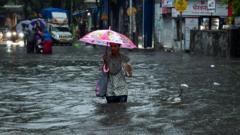In a groundbreaking ceremony, Tuvalu introduced its first cash machines, transforming the banking landscape for its 11,000 residents. The prime minister declared the event as a historic leap into electronic banking, promising new opportunities for economic empowerment.
Tuvalu Marks Historic Shift to Electronic Banking with First Cash Machines

Tuvalu Marks Historic Shift to Electronic Banking with First Cash Machines
The installation of cash machines on Funafuti represents a significant step toward modern banking for the Pacific island nation of Tuvalu.
In a landmark development, the tiny Pacific island nation of Tuvalu has unveiled its first cash machines, introducing a new era of electronic banking for its citizens. The announcement was made public during a ceremony attended by Prime Minister Feleti Teo, local leaders, and banking officials, emphasizing the momentous impact this will have for the 11,000 residents of the island.
Located on Funafuti, Tuvalu's main island, the installation includes five cash machines and 30 sales terminals, marking a significant first in the nation’s ability to offer electronic banking services. Until now, residents had no choice but to physically visit banks to withdraw money, often enduring long queues on paydays. With the introduction of these cash machines, residents will now benefit from increased convenience and efficiency in managing their finances.
"We've been in an analogue space all along, these were dreams for us," expressed Prime Minister Teo, highlighting the significance of this change. He noted that, despite the cost, government determination made the rollout accessible for the people of Tuvalu.
The cash machines will initially only accept prepaid cards; however, plans are underway to introduce international debit and credit card options in the future. For the first time, local shops will also be able to facilitate electronic payments, further modernizing the nation’s economy.
Siose Penitala Teo, head of the National Bank of Tuvalu, emphasized that this shift toward electronic banking and payment systems will pave the way for significant economic empowerment within the community.
Historically known as the Ellice Islands, Tuvalu consists of nine low-lying islands, all vulnerable to climate change and rising sea levels. In a statement at COP29 earlier, Prime Minister Teo warned that climate-induced rising sea levels could result in the submersion of the islands in the future, highlighting the importance of economic resilience for the people of Tuvalu. This new banking infrastructure could help build a more robust economy capable of withstanding such challenges.




















